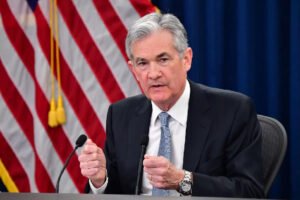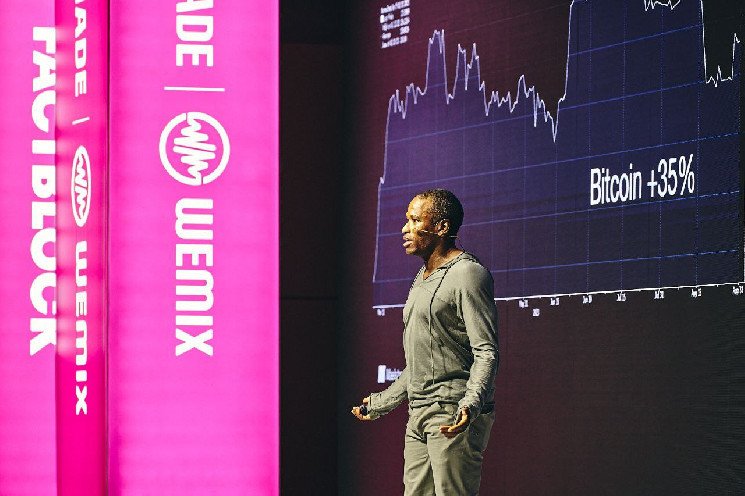Maelstrom has parked 5% of its funds in staked USDe, Hayes told CoinDesk in an email interview.
The fund will rotate that money into crypto after the election results are clear and the losing side accepts the defeat, Hayes added.
It doesn’t matter who wins beyond the short-term, Hayes quipped.
With the U.S. election just a week away, markets are waiting with bated breath for the political event that has created “high uncertainty.”
Arthur Hayes, chief investment officer at digital asset investment fund Maelstrom and co-founder of BitMEX, is hedging the election risk with Ethena Lab’s USDe stablecoin while maintaining large bullish bets in bitcoin (BTC), ether (ETH) and other cryptocurrencies.
“Given the uncertainty, Maelstrom has 5% of the fund in staked USDe (Ethena USD), earning roughly 13%. We maintain our large long positions in Bitcoin, Ether, and other tokens,” Hayes told CoinDesk in an email.
Ethena’s USDe is a synthetic dollar, which uses collateralized stablecoin and a hedged cash-and-carry arbitrage strategy to retail the $1 price peg. The funding fee collected from shorting perpetual futures tied to BTC and ETH as a part of the carry trade represents the yield. Staking USDe and acquiring staked USDe, or sUSDe, a reward-bearing token, automatically grants the user access to protocol rewards.
The fund’s allocation in the delta-neutral product will guard against potential market price swings in the lead-up to the election on Nov. 5 and results, due three days later on Nov. 8.
Maelstrom is an investment fund focused on digital assets and managed by the family office of Arthur Hayes (co-founder, BitMEX). The fund’s mandate is to build a portfolio of infrastructure companies that will serve as the foundation of the next wave of trustless decentralization. In addition to managing the fund, Hayes writes the industry-leading monthly newsletter Crypto Trader Digest.
Watch out for a sore loser
Hayes expects risk assets, including cryptocurrencies, to see increased price turbulence for a while if the losing side takes to the street, causing social unrest.
According to traditional media, Republican Donald Trump and Democrat Kamala Harris are locked in a dead heat. Meanwhile, betting on decentralized prediction platforms has the supposedly pro-crypto Trump leading his rival Harris by a significant margin.
“If the election comes and goes with no social unrest, the markets will rip and roar. Post the election, once we know who wins, and the other side accepts the results, then we will deploy all sUSDe into crypto,” Hayes said.
As of Friday, bitcoin options listed on Deribit signaled volatility of nearly 3.8% for Nov. 8. BTC has historically seen more giant swings on random non-event days.
It doesn’t matter who wins
The outcome of the U.S. election is unlikely to significantly alter Bitcoin’s broader bullish prospects, as budget deficits are likely to continue rising irrespective of who takes the presidency. Bitcoin and gold are perceived as safe haven assets, offering a hedge against budget deficits, which tend to be inflationary.
“Both Trump and Harris will print money in the trillions of dollars. In the medium term, it doesn’t matter who wins. Crypto will do well. In the short term, the market understands the ways in which Trump will stimulate the economy because that is the traditional way it has been done in the past. Tax cuts combined with business-friendly deregulation but with no cuts in benefits is what he will do,” Hayes explained.
Legendary trader Paul Tudor Jones voiced a similar opinion last week, saying inflation will continue to rise regardless of whether Donald Trump or Kamala Harris wins the presidency. Several crypto traders are betting on a bitcoin rally to $80,000 and higher after the election.
Potential war is a short-term risk
Looking past the election, a potential escalation of war in the Middle East or Ukraine could lead to short-term pain for risk asset holders.
“The biggest macro risk is if friends and foes of the U.S. engage in aggressive military action while there is confusion as to who is in charge after the election. War is un-investable in the short-term and this would lead to a global risk off,” Hayes quipped, saying that the war’s inflationary impact would eventually bode well for crypto.
“The way to play this risk is to size positions accordingly and use little to no leverage,” Hayes said.
Read the full article here










